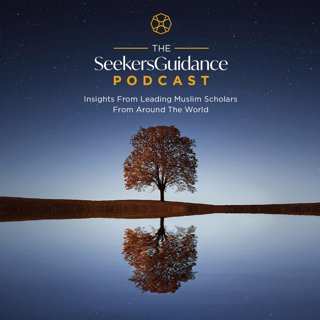
13: Etiquettes of Earning Livelihood – Renewing Religion: An Overview of Ghazali’s Ihya – Shaykh Riad Saloojee
In this lesson, visiting scholar, Shaykh Riad Saloojee gives a brief overview of the chapter on the etiquettes of Earning a Livelihood from Imam Al-Ghazali’s Ihya Ulum al-Din. This chapter is divided into several sub themes: [1] The virtue in earning your own livelihood [2] The fiqh of contracts or the laws that govern the earning livelihood [3] The idea of justice and equity in earning one’s livelihood [4] Excellence in acquiring livelihood [5] The connection between earning livelihood and the afterlife. Shaykh Riad delves into each of the subsection explaining in overview what the main points relating to each are. Shaykh Riad concludes by reminding us that it is possible to have Allah in the background of our hearts with all that we do and that includes while we pursuit our livelihoods. For this reason, Allah has given us a prayer to recite when entering the marketplace with a distinguished and high reward if one says it. That is because Allah wants us to remember Him in the places when most others would find it difficult to do so. In this brief overview of Imam Ghazali’s opus magnum, Ihya Ulum al-Din (Renewing the Religious Sciences), this series will serve as blueprint for how the believer can bring to life their religion. It will aim to help the believer to not just practice the form of the religion properly, but to also practice it with excellence. Join our Ramadan 2017 program: #RamadanRenewal, in-person at SeekersGuidance Toronto or online through the SeekersGuidance Global platform. For more details, visit: http://seekershub.org/ramadan2017. Checkout all of the SeekersGuidance podcasts by visiting https://seekersguidance.org/podcasts/
11 Juni 201727min

Purification – Ramadan Renewal Xtra
Struggling to keep on top of your podcast subscriptions? SeekersHub Ramadan Renewal Xtra offers you a bitesize summary of each night's lessons at SeekersHub Toronto this Ramadan. Catch up on the essential lessons, captured by our media team in this special episode.
10 Juni 20176min

12: Etiquettes of Earning a Livelihood – Renewal by the Book: Quran Tafsir Based on Imam Ghazali’s Ihya – Shaykh Faid Said
In this lesson of Renewal by the Book, we are joined by visiting scholar, Shaykh Faid Said. Shaykh Faid reviews verses from the Quran that correspond to the chapter on the Etiquettes of Acquisition and Earning Livelihood by Imam Ghazali. وَفِي السَّمَاءِ رِزْقُكُمْ وَمَا تُوعَدُونَ And in the heaven is your provision and whatever you are promised. [Quran, 51:22] Allah provides for each their provisions from His generosity and to those whom we may not expect. The sunnah of all Prophets is to share food with people. The story of Prophet Ibrahim, when he invited one of his visitors to believe in God and he refused, Prophet Ibrahim wanted him to leave. However, Allah told Prophet Ibrahim, I have been sustaining him for his whole life, despite his disbelief, and you refuse to feed him. Such is the generosity of Allah. Shaykh Faid reminds us that one should be careful of how they acquire their livelihood but also how they spend it. It is not enough to eat halal but to collect your money from permissible work and permissible means. You can only seek permissible means if you have utmost faith in Allah. Shaykh Faid concludes with a reminder, that we should all rely on Allah for our sustenance but also to act to attain. However, one should always know that their sustenance, first and foremost, is from Allah. In this series Shaykh Faraz, and the other scholars and teachers will be looking at points of reflection from key verses in the Quran. The series will follow the thematic order of Imam Ghazali’s Ihya Ulum al-Din (Renewing the Religious Sciences). The aim is to connect the key verses of guidance from the Book of Allah with the blueprint of renewal, the Ihya, so that we experience a renewal by The Book. Join our Ramadan 2017 program: #RamadanRenewal, in-person at SeekersGuidance Toronto or online through the SeekersGuidance Global platform. For more details, visit: http://seekershub.org/ramadan2017. Checkout all of the SeekersGuidance podcasts by visiting https://seekersguidance.org/podcasts/
8 Juni 201725min

12: Etiquettes of Marriage – Renewing Religion: An Overview of Ghazali’s Ihya – Shaykh Riad Saloojee
In this lesson, visiting scholar, Shaykh Riad Saloojee, gives an overview of the Chapter on the Etiquettes of Marriage by Imam Ghazali. Shaykh Riad delves into the spiritual meanings that can be observed during marriage. Shaykh Riad begins with a beautiful quote that sums up the lesson “two bodies cannot connect in the same way that two souls can”. There are many material benefits to being married, but the real meaning is the connection of our hearts to Allah through it. However, before we come to marriage we need to have an understanding of ourselves. In addition, one should be aware not only of their spiritual self but of their nafs (lower self) as well, to understand my wants and needs in relations to that. Lastly, Imam Ghazali also speaks in the chapter about the fiqh of marriage which is important to learn prior to. There are three main verses of the Quran that the Prophet, peace be upon him, referenced in relations to marriage. All of these verses begin with “oh you who believe” or “oh people have consciousness (taqwa) of Allah”; that is to say that God consciousness is at the centre of any successful marriage and in the dealings between the couple. Conversely, as well, marriage is a way for one to attain greater God consciousness (taqwa). Shaykh Riad reminds us to take marriage as a field of training for my character, one that exposes a person to their faults and shortcomings. As such, it is a great way for one to also grow their character and address their mistakes. Lastly, Shaykh Riad concludes with a reflection on thankfulness and Allah’s promise to increase one if they are thankful; Ramadan is a great time to be thankful and to use the bounties Allah gives us in a way that pleases him. Thus, while fasting, one should be grateful for their spouse, their children and for the love they are blessed with. In this brief overview of Imam Ghazali’s opus magnum, Ihya Ulum al-Din (Renewing the Religious Sciences), this series will serve as blueprint for how the believer can bring to life their religion. It will aim to help the believer to not just practice the form of the religion properly, but to also practice it with excellence. Join our Ramadan 2017 program: #RamadanRenewal, in-person at SeekersGuidance Toronto or online through the SeekersGuidance Global platform. For more details, visit: http://seekershub.org/ramadan2017. Checkout all of the SeekersGuidance podcasts by visiting https://seekersguidance.org/podcasts/
8 Juni 201725min

Faith and Certitude – Ramadan Renewal Xtra
Struggling to keep on top of your podcast subscriptions? SeekersHub Ramadan Renewal Xtra offers you a bitesize summary of each night's lessons at SeekersHub Toronto this Ramadan. Catch up on the essential lessons, captured by our media team in this special episode.
8 Juni 20179min

11: Etiquettes of Eating – Renewing Religion: An Overview of Ghazali’s Ihya – Shaykh Riad Saloojee
In this lesson we are joined by visiting scholar, Shaykh Riad Saloojee, giving a brief overview of the Etiquettes of Eating chapter from Imam Al-Ghazali’s Ihya Ulum al-Din. This is the first chapter in the second quarter of the book, which is on acts of worship. When the heart is in tawheed of Allah through remembrance and reflection then that heart becomes beautified by certain values like patience, such that our character is the image of our heart. This is important to remember, because all the etiquettes of eating are the fruits of a beautified character. Shaykh Saloojee explains that this is the relationship between the first and second quarter of the book. Shaykh Riad asks, how then can one be engaged in remembrance when eating? [1] Mentioning Allah at the beginning and end of eating [2] Facing the food with gratitude and part of that gratitude is manifested in not wasting food [3] Thanking the host for being the means of feeding us and do not criticize the food. [4] Not to eat until satiation, or until one is full; and that takes patience to do that [5] Reflect about what you eat and the bounties Allah has provided you. [6] Have cleanliness in eating by washing your hand before and after as well as eating with three fingers. [7] Eating a morsel at a time, and having patience in chewing it before going on to the next. [8] Prefer others before yourself by feeding others and hosting others. [9] Have chivalry by recognizing the various cultures of those with whom you share food and respecting them. In addition, Shaykh Riad reflects on the etiquettes of eating during Ramadan, one must take extra care in fasting not just from food but from other spiritually harmful acts. For example, one should fast from materialism in general and not just from food. One should be careful at iftar as well, not to demolish their fast by forgetting about having presence of heart when eating. In conclusion, Shaykh Riad reminds us of the importance of being generous in hosting others and be in the service of others by feeding them. The best example of this is the story of Prophet Ibrahim, peace be upon him, that Shaykh Riad relays. In this brief overview of Imam Ghazali’s opus magnum, Ihya Ulum al-Din (Renewing the Religious Sciences), this series will serve as blueprint for how the believer can bring to life their religion. It will aim to help the believer to not just practice the form of the religion properly, but to also practice it with excellence. Join our Ramadan 2017 program: #RamadanRenewal, in-person at SeekersGuidance Toronto or online through the SeekersGuidance Global platform. For more details, visit: https://seekersguidance.org/ramadan/. Checkout all of the SeekersGuidance podcasts by visiting https://seekersguidance.org/podcasts/
7 Juni 20170s

Knowledge & Guidance – Ramadan Renewal Xtra
Struggling to keep on top of your podcast subscriptions? SeekersHub Ramadan Renewal Xtra offers you a bitesize summary of each night's lessons at SeekersHub Toronto this Ramadan. Catch up on the essential lessons, captured by our media team in this special episode.
7 Juni 20179min

11: Supplication – Renewal by the Book: Quran Tafsir Based on Imam Ghazali’s Ihya – Shaykh Riad Saloojee
In the eleventh lesson of Renewal by the Book we are joined by visiting scholar, Shaykh Riad Saloojee. Shaykh Riad reviews key verses of the Quran that correspond to Imam Al-Ghazali’s chapter on supplication. He covers verse 60 from Surat Ghafir, the 40th chapter of the Quran. وَقَالَ رَبُّكُمُ ادْعُونِي أَسْتَجِبْ لَكُمْ ۚ إِنَّ الَّذِينَ يَسْتَكْبِرُونَ عَنْ عِبَادَتِي سَيَدْخُلُونَ جَهَنَّمَ دَاخِرِينَ And your Lord says, "Call upon Me; I will respond to you." Indeed, those who disdain My worship will enter Hell [rendered] contemptible. Shaykh Riad reflects on this verse, indicating that this verse points to one’s relationship with Allah that it is one of neediness. So one should ask Allah for both material and spiritual giving. The verse continues to say that “those who are too proud for My worship...” and worship here refers to supplication. Those who refrain from supplication are thus characterized with arrogance and pride. Thus the scholars say when I find myself refraining from supplication or find it hard to engage in it, then that is an indicator of one’s pride and arrogance. In order for one to engage in proper supplication one should not do it as a form of ritual. Rather, one should engage in supplication with presence of heart and with sincerity. Indeed, one should make supplication like a drowning person with your reliance solely on Allah. In turn, the greatest prize of supplication that your heart is focused on Allah. In conclusion, Shaykh Riad reminds us that the most important part of supplication is reminding ourselves that there are no means other than Allah and that requires work, especially at a time when there may be many other superficial means that one thinks they can rely on, but our true reliance should always be on Allah. In this series Shaykh Faraz, and the other scholars and teachers will be looking at points of reflection from key verses in the Quran. The series will follow the thematic order of Imam Ghazali’s Ihya Ulum al-Din (Renewing the Religious Sciences). The aim is to connect the key verses of guidance from the Book of Allah with the blueprint of renewal, the Ihya, so that we experience a renewal by The Book. Join our Ramadan 2017 program: #RamadanRenewal, in-person at SeekersGuidance Toronto or online through the SeekersGuidance Global platform. For more details, visit: https://seekersguidance.org/ramadan. Checkout all of the SeekersGuidance podcasts by visiting https://seekersguidance.org/podcasts/
6 Juni 20170s





















